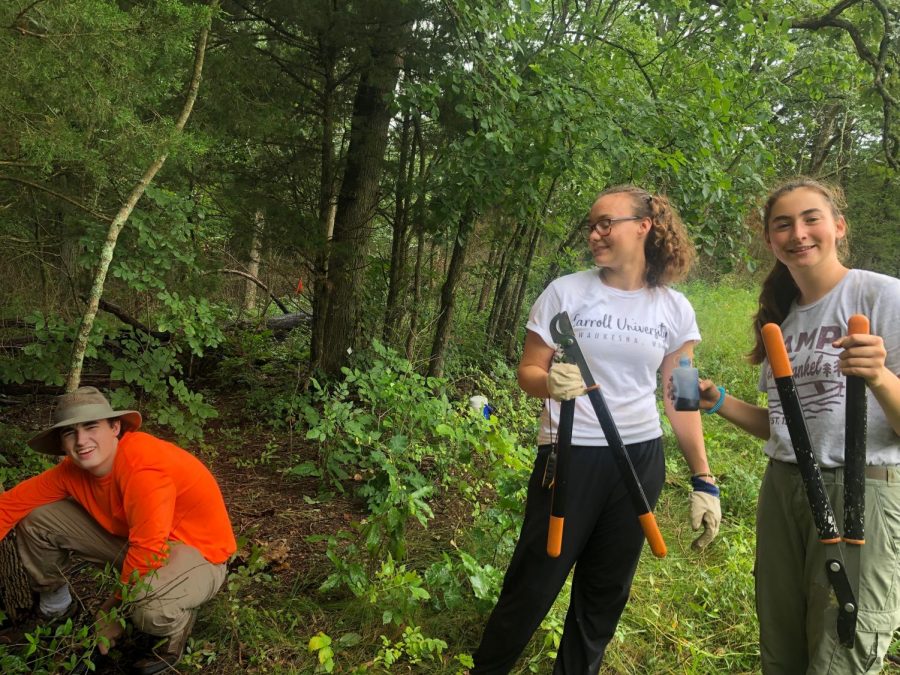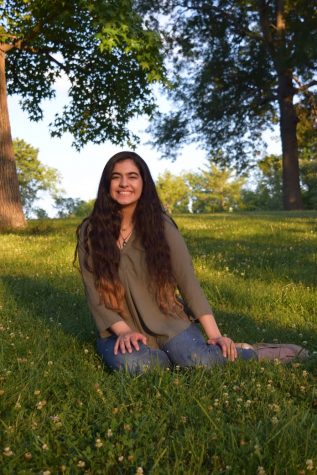During their 12 weeks of summer, many students long to get away from a school environment, but juniors Ella Seigel, Maaz Khan and sophomore Maura Collins spent their summers working at a Washington University in St. Louis nature reserve.
Instead of brick walls and bulletin boards, this learning environment was surrounded by trees, creeks and sunlight. They interned at the Shaw Institute for Field Training (SIFT) and learned about ecology, biology and eco-restoration.
“[The SIFT internship] sounded really interesting when I heard about it, and I got referred through someone I know who worked with Tyson Research Center,” Seigel said. “She said the kids who did this program really enjoyed it, and it was a really fun way to be outside during the summer, so I was excited.”
Activities consisted of learning how to do abiotic testing, going on a bat survey and observing multiple ecosystems such as prairies to see if they were healthy.
“I learned a lot of really useful skills like how to use Global Positioning System (GPS) and how to make dichotomous keys if I were to go into that career path,” Seigel said. “I really don’t know what I’m planning with my future, so it was a good way to look at this field, consider it and get some experience in it just in case it was something I was interested in.”
Collins, on the other hand, is currently thinking of pursuing a career in Environmental Law.
“I’m really interested in science, and I wanted to know what the different fields are and if it’s something that I’m interested in because it’s about teaching field research,” Collins said.
From learning to count and categorize different kinds of organisms, like plants and about mapping topography, Collins believes this internship helped her—and would help others—get exposure to the field.
“I would really encourage people to try [SIFT] just because it’s really fun, and it’s a good opportunity to meet people that have similar interests,” Collins said.
Similarly, Maaz originally decided to go into SIFT just as something to do over the summer that would keep him busy. Yet, as he spent more time at the nature reserve, he realized how much work goes into it and how meticulous the scientists who do it can be.
“No one else in my family has ever done [this] kind of work [before], so having experts in the field teach you about it was a really nice learning experience,” Khan said. “I am not sure if I want to pursue a career in environmental sciences but I am incredibly happy that I get to have a hands-on experience with this field. The work these people do, all of it, is just incredibly admirable.”
Khan currently wants to pursue studies in business or finance but values the experience.
“I didn’t really know how much work actually goes into taking care of the environment,” Khan said. “I was like ‘oh, it’s mostly just picking weeds and whatnot,’ but when we actually went out there, we saw how they collect data and how they decided to make decisions. I didn’t expect environmental scientists to put in as much work as they did. I thought most of the work was done by machines, but a good portion is done by hand which made me realize just how much care and hard work these scientists put in.”
Participants apply for the year-long program, and after one week of training in June, they can sign up for projects when it works with their schedule.
“During training week, at the end of each day, they would give us a professional skills session which would include skills like how to properly introduce yourself, write formal emails, etc. It was great to learn how things are done in the professional world,” Khan said. “Whenever I have a free weekend I might help out there in the future. It’s a really friendly atmosphere, the people there are really nice and it’s really educational. Also, if you just want to see what it’s like to work [environmental] jobs, even if you don’t really have a particular interest in it, it still is really fun to do.”




![Smiling in a sea of Longhorns, Fox 2 reporter Ty Hawkins joins junior Darren Young during the morning Oct. 3 pep rally. The last time West was featured in this segment was 2011. “[I hope people see this and think] if you come to [Parkway] West, you will have the time of your life because there are so many fun activities to do that make it feel like you belong here. I was surprised so many people attended, but it was a lot of fun,” Young said.](https://pwestpathfinder.com/wp-content/uploads/2025/10/Edited2-1200x798.jpg)
![West High seniors and families listen as a representative of The Scholarship Foundation of St. Louis, Teresa Steinkamp, leads a Free Application for Federal Student Aid (FAFSA) workshop. This session, held in the library, provided guidance on financial aid, scholarships and student loan options. “This event is very beneficial for any seniors who are applying to or considering applying to colleges after high school [because] the cost of college is on the rise for seniors and parents,” college and career counselor Chris Lorenz said.](https://pwestpathfinder.com/wp-content/uploads/2025/09/DSC_4478-1200x778.jpg)
![Senior Kamori Berry walks across the field during halftime at the Homecoming football game on Sept. 12. During the pep assembly earlier that day, she was pronounced Homecoming Queen. “I thought it was nice that the crowd [started] cheering right away. I know [my friends] were really excited for me, and my family was happy because typically non-white people don't win,” Berry said.](https://pwestpathfinder.com/wp-content/uploads/2025/09/DSC7046-Enhanced-NR-1200x798.jpg)



![Pitching the ball on Apr. 14, senior Henry Wild and his team play against Belleville East. Wild was named scholar athlete of the year by St. Louis Post-Dispatch after maintaining a high cumulative GPA and staying involved with athletics for all of high school. “It’s an amazing honor. I feel very blessed to have the opportunity to represent my school [and] what [it] stands for,” Wild said.](https://pwestpathfinder.com/wp-content/uploads/2025/05/unnamed-6-1200x714.jpg)
![The Glory of Missouri award recipients stand with their certificates after finding out which virtue they were chosen to represent. When discovering their virtues, some recipients were met with contented confirmation, while others, complete surprise. “I was not at all surprised to get Truth. I discussed that with some of the other people who were getting the awards as well, and that came up as something I might get. Being in journalism, [Fellowship of Christian Athletes and] Speech and Debate, there's a culture of really caring about truth as a principle that I've tried to contribute to as well. I was very glad; [Truth] was a great one to get,” senior Will Gonsior said.](https://pwestpathfinder.com/wp-content/uploads/2025/04/Group-Glory-of-Missouri.jpg)

